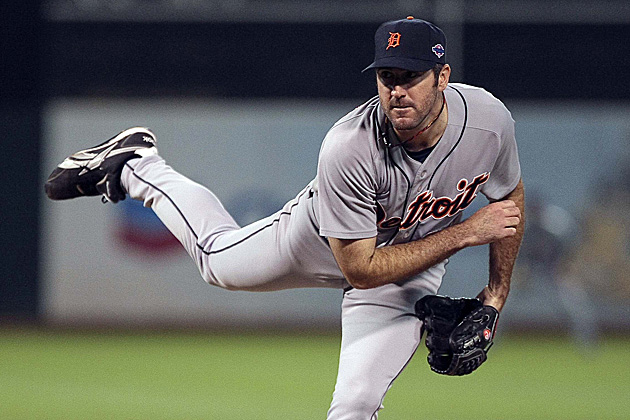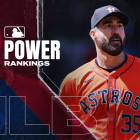 |
| Thanks mostly to his teammates, Verlander got far less credit this season than last. (US Presswire) |
NL Cy Young: Dickey becomes first knuckleballer to win
David Price of the Tampa Bay Rays is the 2012 AL Cy Young Award winner. Tigers ace Justin Verlander was the runner-up after taking the 2011 award in unanimous fashion.
The funny thing is, Verlander wasn't all that different in 2012 than he was in 2011, when he was labeled superhuman and won the Cy Young and AL MVP. The only significant difference is his win-loss record. Verlander was 24-5 last year and "just" 17-8 this year.
Here's what Verlander himself said on the matter before Game 4 of the World Series:
"To be honest with you, I know where the numbers stand," he said. "I think the only thing that really kind of hurts me is the win total, but I think we've seen in recent years the voters have kind of started to look beyond win totals and really kind of dove into the numbers a little bit more, and I think that might be beneficial towards me."
Only it wasn't. At least not with enough voters.
I won't suggest to ignore record -- heaven forbid we eliminate what is essentially a team category when discussing who should win an individual award -- instead I'll explain why the record was different.
First of all, the Tigers scored fewer runs for Verlander this season. They averaged 3.98 runs per start, scoring three runs or less in 17 of his 33 starts. Last season, the Tigers averaged 4.73 runs per start, scoring three runs or less in 13 of his 34 starts. As an aside, I'd love the "a pitcher's job is to win games" people to explain how Verlander could have possibly made the Tigers' offense score more runs for him this season.
Also, Verlander cannot control the defense behind him. The Tigers' defense this season was among the worst in baseball in terms of range. Despite increasing his ground ball percentage from 40.2 percent to 42.3 percent, Verlander's allowed batting average on balls in play (BABIP) went from .236 in 2011 to .273 in 2012. That's easily explained with the awful range by the Tigers' infield, in that grounders found holes a lot more often in 2012 than they did in 2011.
Meanwhile, Verlander's strikeout rate went very slightly up (from 8.96 K/9 to 9.03) and rate of home runs allowed went down (from 0.86 HR/9 to 0.72) in 2012. His walk rate did rise, but overall his fielding-independent pitching (FIP, which is used to better measure a pitcher's ERA in terms of what he can control, eliminating the defensive impact of his teammates) was better this season (2.94) than last (2.99).
Considering the above factors, it's not surprising to see Verlander's WAR was very similar this season to last. Using the Fangraphs.com version, he was at 7.0 last year and 6.8 this year. With Baseball-reference.com's version, he had a 8.3 WAR last year and 7.6 this year.
Aside from the wins-losses measure, which is a team stat in addition to being archaic, traditional numbers aren't much different this season, either. Verlander saw his ERA jump from 2.40 to 2.64, hardly a major leap and one we can easily attribute to the worse defense behind him. He struck out 11 less hitters in 12 2/3 fewer innings with one less start. He had two shutouts (including a no-no) in 2011 compared to one shutout in 2012, but he had six complete games this season and just four in 2011.
None of this is to denigrate Price, who is a worthy winner. My purpose here is to point out the amazing difference in perception between 2011 oh-my-God-he-is-superhuman Justin Verlander vs. 2012 Cy-Young-runner-up Justin Verlander. Basically, the only major difference in Verlander's performance in 2012 compared to 2011 was that his teammates didn't provide him with as much help. And it cost him an individual award.
For more baseball news, rumors and analysis, follow @EyeOnBaseball on Twitter, subscribe to the RSS feed and "like" us on Facebook.





















